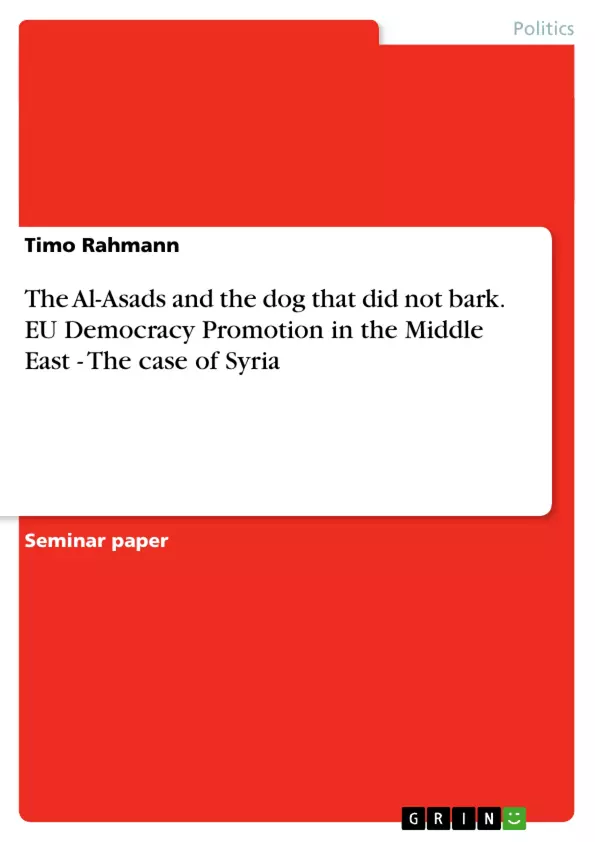The crucial geo-strategic importance of the Mediterranean Region for the states in the European Union (EU) became once again very clear with the international developments after the 9/11 attacks and the following and ongoing so-called “war on terror”. One could enumerate the main big security and political challenges in the Middle East with issues such as religious radicalism, continuing state conflicts, proliferation of weapons of mass destruction (WMD), growing migration pressure towards European states and political systems between the poles of autocracy and instability. These characteristics, perceived as threats to Europe’s own welfare and security interests, are likely ascribed to the region’s distinctive persistence to the gradually accumulating “third wave” of democratization and are linked to the lack of basic democratic structures and human rights there. However, these circumstances raise serious question for Europe’s Mediterranean Policies. Since the Barcelona-Conference of 1995, the Union’s institutionalized response to the destabilizing tendencies in the Middle East is the Euro-Mediterranean Partnership (EMP). According to its, at least formulated, holistic approach to the existing problems in the region, the promotion of democracy is an essential part of it. This follows the wider EU Foreign policy goals, since democracy promotion is, amongst other objectives like economic interests, a centrepiece of it. Recent documents by the Commission, for instance the New Neighbourhood Policy, stressed the significant role of norms and values like democracy, the rule of law and strengthening of human rights out again. This does not necessarily imply any form of altruism, as we will see later, but is, at least to some extent on a theoretical level, simply due to a traditional understanding of foreign policy, namely “to change what others do”. Nonetheless, it is questionable to what extent this policy is in fact influential. For many observers it is a clear-cut, that the well-known structural and practical deficits of the Common Foreign and Security Policy (CFSP), but also the divergent interests between the EU and its partners in the Mediterranean impede a greater progress in the political dimension. This research paper takes up this discussion and examines the actual impact that EU democratization policy on processes towards political liberalization and system opening has, especially in the context of the EMP framework.
Inhaltsverzeichnis (Table of Contents)
- Introduction
- Opening Theoretical Remarks
- Democracy Promotion as a EU Foreign Policy Objective
- The European Union and the Middle East Relations in the Framework of the Barcelona-Process
- Genesis and historical Foundations
- Content and Objectives
- Democracy Promotion and the Political Dimension - Results and Shortcomings
- Case Study: Syria
- Overview
- Syria-EU Relations
- EMP and Democracy Promotions - The Experience with Syria
- Concluding Remarks
Zielsetzung und Themenschwerpunkte (Objectives and Key Themes)
This research paper examines the impact of the EU's democratization policy on political liberalization processes in the Middle East, focusing on the Euro-Mediterranean Partnership (EMP) framework. It explores the influence of European policy on democratization processes in the region, particularly in the context of the Barcelona-Process. The paper also analyzes the case of Syria, a country lagging behind in terms of cooperation with European agencies and political liberalization, to assess the EU's ability to deal with 'difficult' cases.
- EU's democracy promotion policy in the Middle East
- Euro-Mediterranean Partnership (EMP) and its effectiveness
- The role of the Barcelona-Process in promoting democracy
- The case of Syria as a model for examining democratization processes
- The challenges and opportunities for the EU in promoting democracy in the Middle East
Zusammenfassung der Kapitel (Chapter Summaries)
- Introduction: This chapter establishes the context for the research, highlighting the growing security and political challenges in the Middle East and the importance of democracy promotion as a European Union foreign policy objective.
- Opening Theoretical Remarks: This chapter lays the theoretical foundation for the research, setting the stage for the analysis of EU democracy promotion policies.
- Democracy Promotion as a EU Foreign Policy Objective: This chapter explores the historical development and outlines of democracy promotion policy within the European Union.
- The European Union and the Middle East Relations in the Framework of the Barcelona-Process: This chapter examines the genesis, structure, content, and objectives of the Barcelona-Process, focusing on its role in promoting democracy in the region.
- Case Study: Syria: This chapter delves into the case of Syria, analyzing its relationship with the EU and the effectiveness of EMP and democracy promotion strategies in the context of the Syrian experience.
Schlüsselwörter (Keywords)
The research paper focuses on the following key themes: EU democracy promotion, Euro-Mediterranean Partnership (EMP), Barcelona-Process, political liberalization, Middle East, democratization, Syria, case study, foreign policy, security challenges, human rights, Islam, democracy.
Frequently Asked Questions
What is the Euro-Mediterranean Partnership (EMP)?
The EMP, established at the 1995 Barcelona Conference, is a framework for cooperation between the EU and Mediterranean countries to promote stability, security, and democracy.
Why does the EU promote democracy in the Middle East?
Democracy promotion is linked to the EU's own welfare and security interests, aiming to counter threats like religious radicalism, instability, and migration pressure.
How effective is the EU's democratization policy in Syria?
Syria is considered a "difficult" case where cooperation has been limited, and the impact on political liberalization has faced significant structural and practical deficits.
What are the main security challenges in the Mediterranean region?
Key challenges include religious radicalism, state conflicts, the proliferation of weapons of mass destruction, and the lack of basic human rights structures.
Does EU democracy promotion imply altruism?
Not necessarily; it is often a tool of foreign policy meant to align other regions with European norms and values to ensure long-term regional stability.
- Citation du texte
- Timo Rahmann (Auteur), 2005, The Al-Asads and the dog that did not bark. EU Democracy Promotion in the Middle East - The case of Syria, Munich, GRIN Verlag, https://www.grin.com/document/49088



